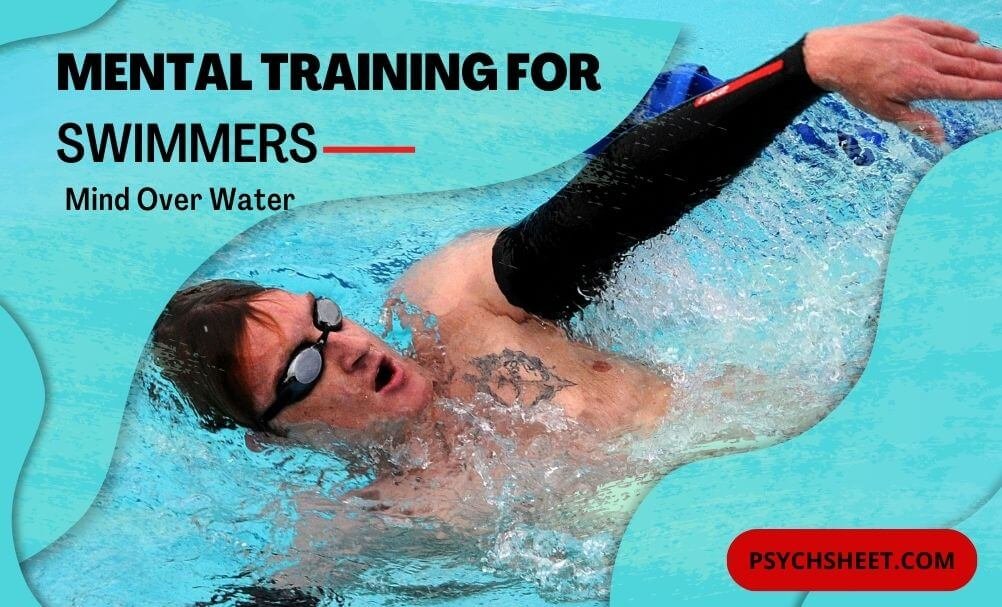Mind Over Water: The Importance of Mental Training for Swimmers

Swimming requires incredible physical endurance, strength, and technique, but it’s not just about the body. Mental training is equally important in achieving peak performance. Many swimmers and coaches have come to realize that a solid mental strategy can make the difference between winning and losing. In this post, we’ll explore how mental training directly impacts swimming performance and delve into the critical skills of visualization, focus, and positive self-talk.
Understanding Mental Training for Swimmers
Mental training involves techniques and exercises that help athletes enhance their psychological state and manage the mental challenges that come with intense competition. For swimmers, it encompasses skills like concentration, resilience, goal setting, and motivation. Athletes with strong mental training can maintain composure under pressure, recover quickly from setbacks, and stay focused during long training periods.
Why Mental Training Matters
- Increased Focus: With countless variables affecting performance in the pool, swimmers must focus on the present moment. Mental training helps eliminate distractions, ensuring focus on the task at hand.
- Reduced Anxiety: Competition can bring nerves and anxiety. Mental training equips swimmers with the tools to manage these emotions, preventing them from hindering performance.
- Consistency in Performance: Mental training allows athletes to develop a reliable pre-race routine and the resilience to bounce back after setbacks, leading to more consistent performance.
- Confidence Boost: Visualization and positive self-talk help swimmers envision success and cultivate self-belief.
- Faster Recovery from Setbacks: Swimmers face challenges like injuries, losses, or failure to reach goals. Mental training teaches them how to refocus and avoid being mentally derailed quickly.
Key Mental Skills for Swimmers
Let’s explore three crucial mental skills that can help swimmers improve their performance: visualization, focus, and positive self-talk.
What is Visualization?
Visualization is like a mental rehearsal. It’s when athletes close their eyes and picture themselves performing perfectly in their sport. They imagine every detail: how they move, how they feel, and even how confident they are during the performance. This technique helps them prepare for actual events because their minds have already ‘practiced’ the moves many times. It’s not just for athletes, though. Anyone can use visualization to prepare for any task, like giving a speech or taking a test. By imagining success, you can boost your confidence and improve your ability to perform when it really counts.
How Visualization Helps Swimmers
- Enhances Muscle Memory: By mentally rehearsing strokes and starts, swimmers can reinforce their technique, leading to smoother movements in the pool.
- Reduces Anxiety: Picturing a successful performance helps swimmers feel more prepared and less anxious before races.
- Boosts Confidence: Visualization lets athletes imagine themselves succeeding, which creates a positive mindset before competition.
- Improves Race Strategies: Mentally reviewing race plans helps swimmers refine pacing and tactics.
How to Practice Visualization
- Find a Quiet Space: Sit or lie down comfortably in a quiet space where you can focus.
- Close Your Eyes: Clear your mind and close your eyes to shut out distractions.
- Use All Senses: Engage as many senses as possible to create a vivid mental picture. Imagine the feel of the water, the smell of chlorine, and the sound of the starting buzzer.
- Visualize Success: Picture yourself executing perfect strokes, strong turns, and a powerful finish.
- Rehearse Specifics: Focus on race starts, pacing, or specific strokes to reinforce positive habits.
2. Focus
What is Focus?
Focus, or concentration, is all about keeping your attention sharp and directed at what’s important at the moment. In activities like swimming, focus means paying attention to your swimming technique, how you breathe, or sticking to your race strategy instead of getting distracted by other swimmers or any pressures you feel from the environment around you. Having good focus helps you perform better because you’re not wasting energy on things that don’t help you achieve your goals. Whether you’re in the pool or doing any other task, improving your focus can lead to better results and a greater ability to handle the task at hand efficiently and effectively.
How Focus Helps Swimmers
- Maintains Technique: Staying focused helps swimmers maintain good form, especially during fatigue or pressure.
- Improves Split Times: Concentrating on pacing and stroke counts leads to more consistent split times.
- Prevents Choking: Focus prevents distractions that cause performance lapses under pressure.
How to Improve Focus
- Develop a Pre-Race Routine: A consistent pre-race routine helps athletes transition from everyday thoughts to a focused competition mindset.
- Practice Mindfulness: Mindfulness exercises like meditation or deep breathing teach athletes to concentrate on the present moment and avoid overthinking.
- Break the Race into Chunks: Divide the race into manageable segments and focus on performing each segment as well as possible.
- Set Process Goals: Process goals, like maintaining good breathing patterns, are more controllable and keep swimmers grounded during races.
- Create Cue Words: Develop positive cue words or phrases, such as “strong” or “powerful,” to reinforce focus during competition.
3. Positive Self-Talk
What is Positive Self-Talk?
Positive self-talk is about transforming the way we speak to ourselves in our minds. It involves shifting from negative or doubtful thoughts to words that are encouraging and motivating. For example, instead of telling yourself “I can’t do this,” with positive self-talk, you would say, “I will give it my best shot.” This change in internal dialogue can boost your confidence and help you handle challenges better. By practicing positive self-talk regularly, you can develop a more optimistic outlook on life, improve your mental well-being, and achieve your goals with a more positive and proactive attitude.
How Positive Self-Talk Helps Swimmers
- Improves Confidence: Positive affirmations remind swimmers of their strengths and boost self-belief.
- Reduces Negative Thinking: Counteracts negative thoughts that undermine performance and lead to anxiety.
- Maintains Motivation: Motivating statements push swimmers to keep working hard, especially during training slumps.
How to Develop Positive Self-Talk
- Identify Negative Patterns: Recognize when you’re having negative thoughts about yourself, your abilities, or your goals.
- Challenge Negative Thoughts: Question the validity of these thoughts. Are they realistic or just self-sabotaging?
- Replace with Positivity: Replace negative thoughts with constructive affirmations like “I am strong” or “I am well-prepared.”
- Use Positive Statements: Create a list of affirmations to repeat before and after practice, during training, or right before a race.
- Personalize Statements: Use statements that resonate with your personal experiences, goals, and challenges.
Implementing Mental Training in Your Routine
Mental training should be incorporated into your daily routine just like physical practice. Here are a few practical ways to implement these skills:
- Daily Visualization: Dedicate 5-10 minutes daily to visualization exercises, focusing on a specific stroke, race plan, or technique.
- Pre-Race Focus Ritual: Develop a consistent pre-race focus routine that includes breathing exercises, visualization, and positive self-talk.
- Mindfulness Practice: Include short meditation or mindfulness sessions to reduce stress and improve concentration.
- Review Progress: Periodically review your mental training progress by keeping a journal of thoughts, feelings, and challenges you’ve overcome.
Conclusion
Swimming mental training is crucial for success in the pool. Whether you’re aiming for a personal best or dreaming of Olympic gold, skills like visualization, focus, and positive self-talk are key. By making mental training exercises a part of your daily routine, you build a stronger, more resilient mindset. This mental toughness gives you a competitive edge, empowering you to swim confidently toward victory. Remember, a strong mind is just as important as a strong body in achieving your swimming goals.
Why Choose Coach Mike?
Choosing Coach Mike for mental training in swimming is a smart choice for young athletes. Coach Mike has developed a new course specifically for swimmers aged 7-18. This program is crafted to enhance their mental abilities, focusing on boosting their enjoyment and their performance. With Coach Mike, young swimmers learn better practice habits and smarter racing strategies. His approach to mental training helps swimmers not just in the pool, but in everyday life, building confidence and focus. Coach Mike’s course is the way to go if you want your child to swim better and enjoy the sport more.
